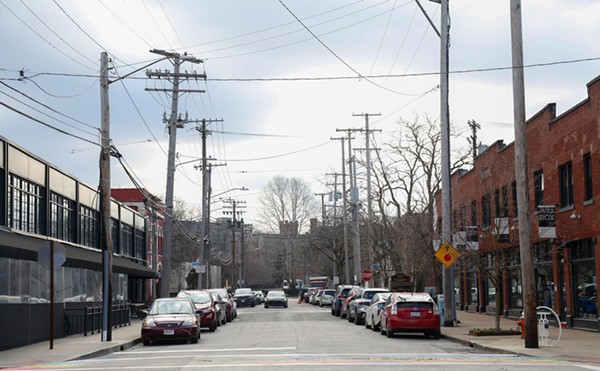Local talent gets a piece of the action: Regarding the "Uh Oh in Ohio" piece [November 10]: It was disappointing to read the second Scene piece in a couple of months slamming the Cleveland film industry.
Punch said, "Left coasters are eating up the budget, while the local production crew is getting a pittance." First, it's in the interest of productions to hire every qualified local crew person they can find. It is much more expensive to transport outside crew and house and feed them. Contrary to what your piece says, production assistants customarily make $100-$175 per day on commercials, not on feature films. Films pay less across the board than commercials do.
The vast majority of the crew -- local and visitors -- are union, making rates and benefits set in collective bargaining. Productions like Oh in Ohio employ local electricians, carpenters, painters, truck drivers, hair and makeup professionals, camera personnel, and many others -- most of whom are in one of three unions. Any differences in rates are based on seniority, not geography.
Attacking projects that are spending millions of badly needed dollars here is like cutting off our noses to spite Cleveland's face. The Greater Cleveland Film Commission worked for three years to recruit this project. The producers came here, despite the fact that Illinois, New York, and Pennsylvania now offer substantial financial incentives. Film production provides substantial dollars to local businesses -- over $32 million since we started in 1998.
It would be nice if one of our two main weeklies supported our efforts -- rather than repeatedly insulting these productions and leaving them wondering why they bothered to come to Cleveland.
Chris Carmody, President
Greater Cleveland Film Commission
Muny Missteps
Let us count the ways: Mike Roberts' brilliant reporting about Cleveland's slide to mediocrity is a bright example of how good journalism could be, if only reporters would dig for the true, but often hidden, motives behind alliances between business and government ["A Century of Bumbling," November 24].
I'd like to offer two more reasons for Cleveland's decline: the Celebrezze administration's use of lucrative federal urban-renewal grants -- the most received by any American city -- to knock down whole neighborhoods in the 1950s and drive out tens of thousands of longtime working-class families from their homes, and the Gund brothers moving their National Hockey League franchise from Cleveland to Minneapolis in the late '70s.
Your readers can probably add many more similar failures of Cleveland's leadership.
Jim Cox
Cleveland
That must be some parking lot: "A Century of Bumbling" [November 24] was a pleasure to read. I would like to see a follow-up on what we could do to improve Cleveland's future. I would like to nominate two possible subjects:
First, there is the stranglehold the Ohio Turnpike has on our region. Cleveland, by its very location, is a natural distribution center, just as it was a great location for industry in the past. Instead, Columbus, which has multiple free roads, has become the largest distribution center in Ohio. Arriving in Cleveland from the east or west requires the use of the turnpike; there are few other through roads in either direction.
As originally envisioned, the turnpike was to have become a free state road when the bonds were paid off. But the pols, bureaucrats, and AAA were convinced that the road would be better maintained if it remained a toll road. The AAA has since recanted, but to no avail. We need a concerted political will to reverse this deadly situation.
As for downtown Cleveland, I avoid it totally. I cannot park at a reasonable price. People who work there must pay $1,000 a month or more. What average worker or even one who earns $50,000 can afford to spend 24 percent of their pay on parking?
Wade Hamilton
Cleveland
Nudes for Peace
Tunick speaks up for the disrobed: I viewed the Sharon Reed TV piece two weeks after it aired in Cleveland ["Bare-Naked Sharon," November 24]. I would like to say that Sharon Reed is brave and dignified in her reporting. It's admirable that a person who is a newscaster can tell the story of a public artwork by being an active participant without clothing.
Sharon Reed's TV report may not be award-worthy, but it's important. With all the negative press surrounding Janet Jackson, Desperate Housewives, and the FCC's ridiculous fines, the body nude in art and life needs to regain its strength against people trying to criminalize it. The naked body is not a weapon.
Spencer Tunick
Brooklyn, New York
Bright Idea
Clarity, every journalist's goal: Just wanted to drop a line to tell you what a great magazine you have. It definitely is one of the best out there. Keep up the good work. I recommend it to everyone I know.
Yessir, it is the best at cleaning mirrors, windows -- all glass products! Sometimes I even read it! Happy holidays.
Terry Malica
Independence












